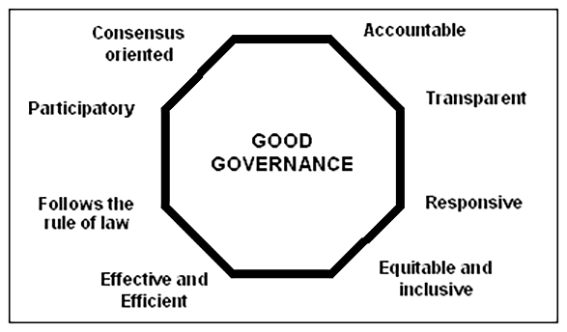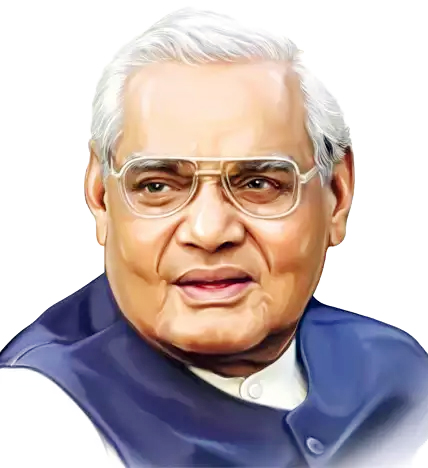Governance
Good Governance Day
- 26 Dec 2020
- 6 min read
Why in News
Good governance day is celebrated annually on 25th December to mark the birth anniversary of the former Prime Minister Atal Bihari Vajpayee.
- The aim is to create awareness of accountability in government among the citizens of India.
Key Points
- Governance:
- It is the process of decision-making and the process by which decisions are implemented (or not implemented).
- Governance can be used in several contexts such as corporate governance, international governance, national governance and local governance.
- Eight Characteristics of Good Governance (as identified by the United Nations):
- Participation:
- People should have a voice in decision-making, either directly or through legitimate intermediate institutions that represent their interests.
- Rule of law:
- Legal frameworks should be fair and enforced impartially, particularly the laws on human rights.
- Transparency:
- Transparency is built on the free flow of information. Processes, institutions and information are directly accessible to those concerned with them, and enough information is provided to understand and monitor them.
- Responsiveness:
- Institutions and processes try to serve all stakeholders within a reasonable timeframe.
- Consensus orientation:
- Good governance requires mediation of the different interests in society to reach a broad consensus in society on what is in the best interest of the whole community and how this can be achieved.
- Equity:
- All groups, particularly the most vulnerable, have opportunities to improve or maintain their well being.
- Effectiveness and efficiency:
- Processes and institutions produce results that meet needs while making the best use of resources.
- Accountability:
- Decision-makers in government, the private sector and civil society organisations are accountable to the public, as well as to institutional stakeholders.
- Participation:
- Challenges to Good Governance in India:
- Women Empowerment:
- Women are not adequately represented in government institutions, and other allied sectors.
- Corruption:
- The high level of corruption in India has been widely perceived as a major obstacle in improving the quality of governance.
- Delay in Justice:
- A citizen has the right to avail timely justice, but there are several factors, because of which a common man doesn’t get timely justice. One such factor is lack of personnel and logistics under disposal of court.
- Centralisation of Administrative System:
- Governments at lower levels can only function efficiently if they are empowered to do so. This is particularly relevant for the Panchayati Raj Institutions (PRIs), which currently suffer from inadequate devolution of funds as well as functionaries to carry out the functions constitutionally assigned to them.
- Criminalisation of Politics:
- The criminalisation of the political process and the unholy nexus between politicians, civil servants, and business houses are having a baneful influence on public policy formulation and governance.
- Environmental security, sustainable development.
- Challenges of globalization, liberalisation and market economy.
- Women Empowerment:
- Initiatives Taken:
- Good Governance Index:
- GGI has been launched by the Ministry of Personnel, Public Grievances & Pensions to determine the status of governance in the country.
- It assesses the impact of various interventions taken up by the State Government and UTs.
- National e-Governance Plan:
- It has the vision to “make all government services accessible to the common man in his locality, through common service delivery outlets and ensure efficiency, transparency & reliability of such services at affordable costs to realize the basic needs of the common man.”
- Right to Information Act, 2005:
- It plays an effective role in ensuring transparency in governance.
- Other Initiatives: Setting up of NITI Aayog, Make in India programme, Lokpal, etc.
- Good Governance Index:
- Atal Bihari Vajpayee was born on 25th December, 1924 in the erstwhile princely state of Gwalior (now a part of Madhya Pradesh).
- He entered in national politics during the Quit India Movement of 1942 which hastened the end of British colonial rule.
- In 1947, Vajpayee started working as a journalist for newspapers of Deendayal Upadhyaya — Rashtradharma (a Hindi monthly), Panchjanya (a Hindi weekly) and the dailies Swadesh and Veer Arjun. Later, influenced by Syama Prasad Mookerjee, Vajpayee joined the Bharatiya Jana Sangh in 1951.
- He was the former Prime Minister of India and was elected to the position twice in 1996 and 1999.
- As a parliamentarian, Vajpayee was awarded with the Pandit Govind Ballabh Pant Award for Best Parliamentarian in 1994, which defines him as "a role model par excellence for all legislators."
- He was conferred with the country's highest civilian honour, the Bharat Ratna in 2015 and second-highest civilian honour, the Padma Vibhushan in 1994.






